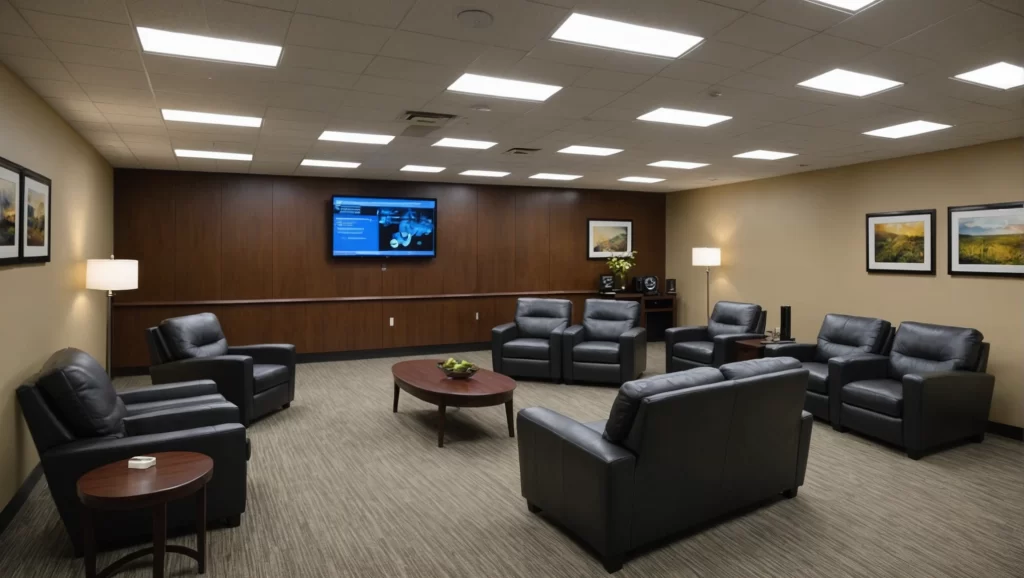Mental Health Hospitals Near Me? Are you or someone you know struggling with addiction?
It can be a tough road, filled with uncertainty and fear.
Maybe you’ve heard about the benefits of seeking help but are unsure where to start.
You might be asking yourself:
- What are the best addiction recovery options?
- How do I find the right mental health hospitals near me?
- Will a mental health hospital actually help?
If these questions resonate with you, you’re in the right place. Let’s dive deep into how mental health hospitals can play a crucial role in recovery and how you can find the support you need.
Why Are Mental Health Hospitals Near Me Important in Recovery?
The journey to recovery from addiction is complex and unique for everyone.
Mental health hospitals near me offer specialized care that can be life-changing for individuals facing addiction and co-occurring mental health disorders.
These facilities provide an environment that focuses on healing and understanding.
The Connection Between Addiction and Mental Health
Addiction doesn’t exist in a vacuum.
It often intertwines with mental health challenges, such as depression, anxiety, or trauma.
According to studies, nearly 50% of individuals with substance use disorders also experience mental health disorders.
This connection is crucial because:
- Untreated mental health issues can fuel substance abuse.
- Substance abuse can exacerbate mental health problems.
In mental health hospitals near me, you get a comprehensive approach to treatment.
This dual diagnosis care is vital for sustainable recovery.
Types of Treatment Available at Mental Health Hospitals Near Me
When you step into a mental health hospital, you open the door to a range of services designed to support your recovery journey.
Here are some common types of treatment you might encounter:
Inpatient Treatment
- What is it? You stay at the hospital for an extended period, typically several days to weeks.
- Benefits: 24/7 medical care, structured environment, and intense therapy.
Outpatient Treatment
- What is it? You attend therapy sessions without staying overnight.
- Benefits: Flexibility to continue daily life while receiving care.
How does outpatient drug rehab work?
You’ll typically attend sessions a few times a week for therapy, support groups, and skill-building workshops.
Intensive Outpatient Programs (IOP)
- What is it? A step up from traditional outpatient treatment, IOPs provide more frequent sessions.
- Benefits: A stronger focus on recovery while allowing you to live at home.
Medication-Assisted Treatment (MAT)
For those struggling with cravings, facilities often provide MAT, using medications like Vivitrol to help reduce urges.
- Vivitrol clinics near me offer a structured environment for administering these medications, ensuring you’re monitored closely.
Finding the Right Mental Health Hospitals Near Me

The search for mental health hospitals near me can feel overwhelming.
Where do you even begin?
Here’s a step-by-step guide to help you navigate your options:
- Start with Research:
- Look up local mental health clinics near me.
- Read reviews and testimonials.
- Consult with Healthcare Providers:
- Speak to your doctor about potential recommendations.
- Ask for referrals to specialists.
- Evaluate Treatment Options:
- Inquire about their approach to both mental health and addiction treatment.
- Ensure they offer tailored programs, like faith-based programs or Christian-based rehabs if that’s important to you.
- Assess Accessibility:
- Consider locations that are convenient to you.
- Look for facilities that offer telemedicine options if in-person visits are challenging.
- Check Insurance Coverage:
- Understand your insurance benefits related to addiction treatment columbus.
- Call your insurance provider to clarify what’s covered.
- Visit Facilities:
- If possible, take a tour of the mental health hospitals near me you’re considering.
- Meet with staff and get a feel for the environment.
Local Resources to Consider
- Pathways Marysville Ohio: Known for holistic approaches to recovery, offering a range of services.
- Recovery Street Central Dayton Ohio: Provides robust support systems for individuals in recovery.
- House of Freedom Drug Rehab Center: A comprehensive option focusing on both addiction and mental health.
The Role of Addiction Therapy Services in Mental Health Hospitals
Addiction therapy services are an essential component of treatment in mental health hospitals near me.
They focus on helping individuals understand and overcome the root causes of their addiction.
What They Do in Rehab
Therapy can take various forms, each tailored to meet individual needs:
- Individual Counseling: One-on-one sessions focusing on personal struggles and triggers.
- Group Therapy: Shared experiences foster community and support, helping you realize you’re not alone in your journey.
- Family Therapy: Involves loved ones in the healing process, helping rebuild trust and communication.
By integrating these services, mental health hospitals can address both mental health and addiction simultaneously, promoting holistic recovery.
Stories of Hope: Real-life Examples
Let’s look at a few stories to illustrate how mental health hospitals near me can be transformative:
Example 1: Sarah’s Journey
Sarah struggled with alcohol addiction for years.
She often found herself in alcohol rehab centers in Ohio, but nothing seemed to stick.
It wasn’t until she entered a mental health hospital that she found the support she needed.
With the help of individualized counseling and group therapy, she began to confront the trauma behind her addiction.
Now, Sarah helps others through Christian-based rehab programs, believing deeply in recovery and the power of shared experiences.
Example 2: Tom’s Transformation
Tom was a high-functioning addict who was terrified of losing his job.
He didn’t think he needed mental health help near me until a colleague intervened.
He found a mental health clinic near me that offered both therapy and Vivitrol treatment.
After several months of dedicated effort and support from the clinic, Tom is now in recovery and advocates for mental health awareness in the workplace.
Understanding the Importance of Ongoing Support
Recovery doesn’t stop when you leave a mental health hospital.
It’s a continuous journey.
That’s why finding ongoing support is crucial.
Aftercare Programs
Many addiction recovery centers in Columbus offer aftercare programs to help you maintain your sobriety.
- Support Groups: Engage with others who share your experiences.
- Continued Therapy: Regular check-ins with a mental health therapist near me can help you stay accountable.
Community Resources
- Central Ohio Recovery Inc.: Offers various services, including group therapy and support.
- Faith Family Recovery Center: Provides resources tailored for those seeking faith-based support.
These resources can make all the difference in maintaining your recovery long-term.
Frequently Asked Questions (FAQs)
Q: How do I know if I need to go to a mental health hospital?
A: If you’re struggling with addiction and mental health issues, seeking help from mental health hospitals near me is a proactive step.
If your daily life is impacted by your addiction or mental health challenges, it’s time to reach out for help.
Q: What is the process of getting admitted to a mental health hospital?
A: Admission typically starts with an assessment, where professionals evaluate your needs. You’ll discuss your history, current struggles, and goals for treatment.
Q: How long will I need to stay in a mental health hospital?
A: Stays can vary widely. Some may need just a few days, while others may require weeks or months. It all depends on your specific situation and treatment goals.
Q: Are mental health hospitals just for severe cases?
A: Not at all. They cater to a wide range of needs, from those in crisis to those looking for comprehensive support in their recovery journey.
Q: What if I have insurance? Will it cover my stay?
A: Many insurance plans do cover treatment in mental health hospitals near me, but it’s crucial to verify your specific coverage details.
Navigating the Complex Landscape of Recovery
As we dive deeper into the role of mental health hospitals near me, it’s essential to understand the various dimensions of recovery.
Every journey is unique, filled with challenges, victories, and learning experiences.
The Importance of Personalized Care
One of the most significant advantages of seeking help at mental health hospitals near me is the personalized care they provide.
In a world where one-size-fits-all approaches often fail, tailored treatment is vital.
Creating Individualized Treatment Plans
When you enter a mental health hospital, the first step is typically an assessment.
This assessment helps create an individualized treatment plan that focuses on:
- Your specific needs: Whether it’s managing cravings, addressing trauma, or both.
- Setting achievable goals: Short-term and long-term objectives to keep you motivated.
- Incorporating various therapies: Such as cognitive-behavioral therapy (CBT), dialectical behavior therapy (DBT), or group therapy.
Collaborative Treatment Teams
The treatment process at mental health hospitals near me involves a team of professionals.
This team may include:
- Psychiatrists: Medical doctors who can prescribe medications like Vivitrol to help manage addiction and mental health symptoms.
- Therapists and Counselors: Professionals who guide you through therapy sessions, helping you unpack emotional struggles and coping mechanisms.
- Nurses: They provide essential medical care and monitor your well-being throughout your stay.
- Social Workers: They help connect you with community resources and support systems post-treatment.
This collaborative approach ensures that you receive comprehensive care tailored to your unique situation.
Understanding Various Treatment Modalities
Inpatient vs. Outpatient Care
When considering mental health hospitals near me, it’s essential to understand the distinction between inpatient and outpatient care.
Inpatient Treatment
Inpatient treatment typically involves staying at a facility for several days to weeks.
Key benefits include:
- 24/7 Support: You have constant access to healthcare professionals, which is crucial during early recovery.
- Structured Environment: Daily routines are set, providing stability as you navigate your recovery.
Outpatient Treatment
Outpatient care allows you to live at home while attending therapy sessions.
Key benefits include:
- Flexibility: You can maintain daily responsibilities, such as work or family commitments.
- Gradual Transition: It helps ease the transition back into everyday life while still providing support.
Group Therapy and Support Systems
Group therapy is a staple in many mental health hospitals near me.
It involves sharing experiences with others facing similar challenges.
This can be incredibly empowering for many reasons:
- Connection: You realize you are not alone in your struggles.
- Support: Sharing and hearing others’ stories can inspire hope and motivate you.
- Diverse Perspectives: You gain insights and coping strategies from others’ experiences.
Cognitive Behavioral Therapy (CBT)
CBT is a common approach used in mental health hospitals to treat both addiction and mental health disorders.
It focuses on identifying negative thought patterns and replacing them with healthier ones.
Benefits of CBT include:
- Skills Development: Learning practical skills to cope with cravings and triggers.
- Structured Sessions: These sessions provide a clear framework for tackling issues.
The Role of Medications in Recovery
For many, medications play a critical role in recovery.
In facilities like mental health hospitals near me, healthcare providers can prescribe medications tailored to individual needs.
Vivitrol: A Case Study
Vivitrol is a non-narcotic medication used to treat alcohol and opioid dependence.
Here’s how it works:
- Reduces Cravings: It blocks opioid receptors, helping to diminish cravings and reduce the likelihood of relapse.
- Administered Monthly: Vivitrol is typically administered as a monthly injection, making it easier to adhere to treatment.
If you’re searching for Vivitrol clinics near me, look for facilities that offer comprehensive support services along with medication management.
Other Medication Options
In addition to Vivitrol, several other medications may be prescribed:
- Methadone and Buprenorphine: Used in opioid addiction treatment, these medications help manage withdrawal symptoms.
- Antidepressants or Antianxiety Medications: Often prescribed for co-occurring mental health disorders, providing relief from symptoms that may trigger substance use.
Building a Support Network for Lasting Recovery

Recovery is not a solo journey.
Having a robust support network is vital.
Friends and Family Involvement
Engaging loved ones in the recovery process can enhance your chances of success.
Ways to involve them include:
- Family Therapy: Many mental health hospitals near me offer family therapy sessions to rebuild trust and communication.
- Support Groups: Encourage family members to attend support groups for families of addicts, helping them understand your struggles.
Community Resources
Once you leave a mental health hospital, maintaining a support network is crucial.
Consider connecting with local resources, such as:
- Alcohol Treatment Centers in Ohio: These can provide ongoing counseling and support.
- Faith-Based Programs: Many people find solace and strength in faith-based recovery options.
Aftercare Programs
Aftercare programs play a significant role in transitioning from inpatient to outpatient care.
They can include:
- Continued Therapy: Regular sessions with a mental health therapist near me help you stay on track.
- Support Groups: Attend local support groups to share your experiences and challenges with others.
Addressing the Stigma of Mental Health and Addiction
Despite the growing awareness of mental health issues, stigma still exists.
Mental health hospitals near me can help address this stigma in various ways.
Education and Advocacy
- Community Outreach: Many facilities engage in community education, helping to destigmatize mental health and addiction.
- Workshops and Seminars: These events raise awareness about the realities of addiction and mental health, promoting understanding and compassion.
Personal Stories
Hearing personal recovery stories can be powerful.
When individuals share their experiences of overcoming addiction, it helps humanize the struggle and demonstrates that recovery is possible.
Frequently Asked Questions (FAQs) Continued
Q: How can I prepare for my stay at a mental health hospital?
A: Prepare by bringing necessary personal items, understanding your treatment goals, and being open to the process.
Communicate any concerns with the admissions staff upon arrival.
Q: What should I expect during my first few days?
A: The first few days will likely involve assessments, introductions to staff, and getting acclimated to the environment. You’ll start individual and group therapy sessions soon after.
Q: Can I maintain a job while in treatment?
A: If you choose outpatient treatment, you may be able to continue working. Discuss your situation with your therapist to create a plan that balances work and recovery.
Q: How long should I stay in treatment?
A: The length of stay varies based on individual needs. Discuss your treatment goals with your care team to determine the best plan for you.
Q: What if I relapse after treatment?
A: Relapse is often a part of the recovery journey. If it happens, seek immediate help from your support network or return to mental health hospitals near me for additional support.
Conclusion: Embracing the Path to Recovery
The road to recovery is filled with twists and turns.
Mental health hospitals near me serve as vital resources for individuals struggling with addiction and mental health challenges.
They provide comprehensive care, support systems, and tailored treatment plans essential for healing.
Remember, seeking help is a sign of strength.
Whether you’re considering inpatient or outpatient treatment, don’t hesitate to reach out to local resources.
Take that first step towards a healthier, happier life.
Mental health hospitals near me are here to support you in your journey to recovery.
Your path starts now.
Reach out and find the help you deserve!
Call Us Now!
If you or a loved one is struggling with heroin or alcohol dependency, reach out to Ridgeline Recovery Center in Columbus, Ohio, today. At Ridgeline Recovery, we offer a path to hope and healing. Our comprehensive Addiction Recovery services include Addiction Therapy, Addiction Treatment, Vivitrol Clinic and specialized Mental Health Services designed to support your journey to recovery.
We provide Aftercare Programs and Peer Support to ensure you have ongoing assistance after treatment. Our dedicated team offers Case Management and Child Services for those needing extra support. For individuals who prefer a faith-based approach, we offer Faith-Based Recovery options.
Our programs feature Group and Individual Counseling, along with Medication-Assisted Treatment (MAT) to address your unique needs. We also have an Intensive Outpatient Program (IOP) and a Partial Hospitalization Program (PHP) for more structured care.
Our team includes Registered Nurse Services, Psychiatric Services, and Therapeutic Behavioral Services (TBS) to provide comprehensive support throughout your recovery process. We work with various Insurance Coverage plans to help you access the care you need.
Don’t wait—contact us now to start your journey toward a brighter future with Ridgeline Recovery.
For more stories and information Contact Us, visit our Blog page and Stories & Highlights.



